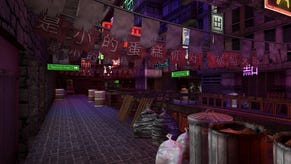Deus Ex
First person RPG reviewed
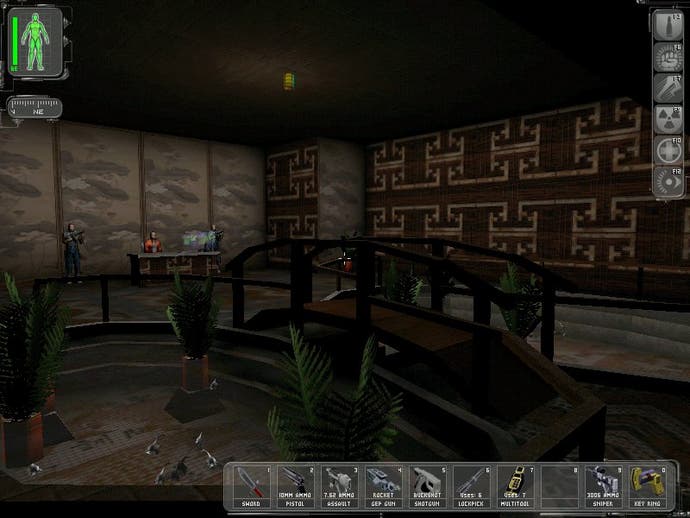
Third Time Lucky?
It's hard to muster any excitement about an Ion Storm game any more. Dominion and Daikatana both promised so much, and delivered so little, that the company has become the games industry equivalent of the boy who cried wolf.
Screenshots, no matter how good looking, are distrusted. Interviews and previews, no matter how positive, are taken not so much with a pinch of salt, as with the entire saline content of the Atlantic. But it's all too easy to forget that Ion Storm isn't just one studio. There is a second Ion Storm studio out in Austin which is much quieter and, on paper, has much more potential.
Deus Ex is the third product to bear the Ion Storm name, but the first to originate from this second studio. So rather than considering the negative connotations now borne by the Ion Storm brand, perhaps we should look at the other name on the box - that of Warren Spector, best known for the incredible System Shock, an innovative blend of the first person shooter and role-playing game which stands out as one of the unsung greats of the 1990s games market.
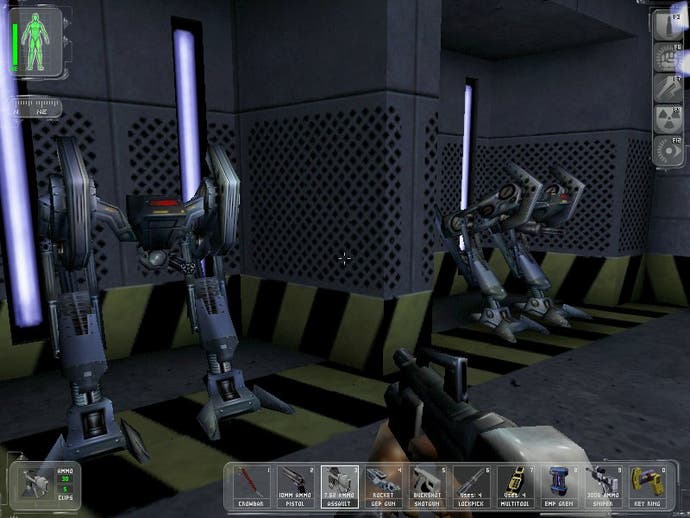
The Truth Is Out There
In Deus Ex you take on the role of JC Denton, an agent for futuristic global police organisation UNATCO. While UNATCO agents in the past were physically augmented with mechanical parts to make them better in combat, you and your brother Paul are the first in a line of agents augmented with nanotechnology - tiny cell-sized machines which reside inside the body and increase strength or speed, or provide any of a number of other enhancements to an agent.
UNATCO agents are the front line of defence in a world gone mad - the gritty urban environments of Deus Ex are populated by powerful terrorist organisations, gangsters, and pathetic sufferers of the disease known as the Grey Death - a global epidemic for which the only cure, Ambrosia, is very scarce and available only to the top tiers of society.
As the game progresses, however, it becomes clear that UNATCO and the shadowy organisations behind it aren't the force for democracy and justice that they would appear to be. The twisting plot of Deus Ex reveals wheels within wheels in a global conspiracy of epic proportions, and although you can simply rush through the game if you like, the urge to explore all of the sub-plots and undertake as many hidden missions as possible will be rewarded with further information about your character and the organisations you work for.
Deus Ex concentrates on plot and character development, drawing inspiration heavily from the likes of Todd McFarlane's "Spawn" animated series and Chris Carters "The X-Files" and "Millennium", although the design and atmosphere of the game is closer to "Blade Runner".
Most of the characters in the game have large amounts of spoken dialogue, and while the voice acting in the game is unlikely to be nominated for any awards, it is quite good - certainly nowhere near the ridiculously bad voice acting in the likes of Resident Evil, although not quite up to TV standards either.
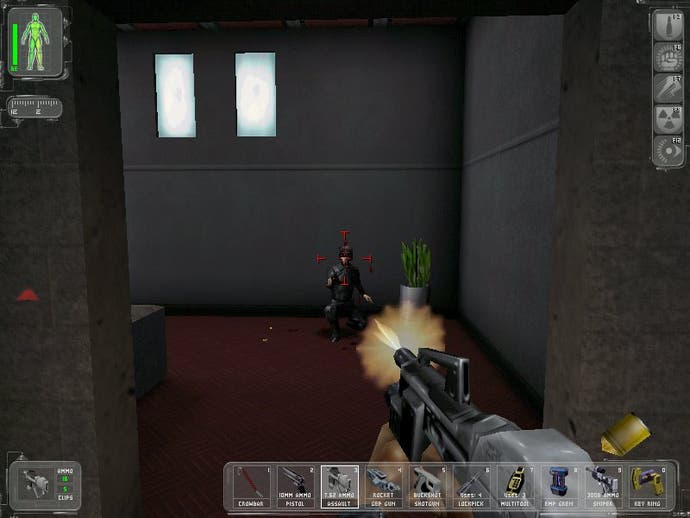
Ghost In The Machine
With this focus on plot and characters comes a different perspective on the play mechanics of the first person genre. A far cry from the ultra-violence and speed of Unreal Tournament, Quake 3, or even Half-Life, Deus Ex draws more from cerebral masterpieces like Metal Gear Solid and, surprisingly enough, System Shock.
While it is perfectly possibly to play through the game by killing all that stand in your way, there are multiple more intelligent ways of advancing in the game, and you will often find that a softly softly approach will be rewarded with additional items, information, or dialogue. The use of items such as gas, EMP or scrambler grenades, pepper spray, lock picks and electronic hacking devices can often yield an ingenious (or in some cases, downright evil) solution to a problem which will have you patting yourself on the back for hours.
In contrast, the combat system itself, while certainly passable, is nowhere near the slickly polished mayhem of CounterStrike or the like. While this is partially due to the low framerate often experienced during combat (a hangover from the Unreal engine used in the game, which suffers from framerate problems when detail is high), it is mainly caused by a weapons system which actively promotes sneakiness.
A headshot from most weapons will kill instantly, but flicking around to suddenly hit someone's head is impossible - the targeting reticule takes time to lock on to a target, and until it does so accuracy is significantly lessened. Spraying bullets is also discouraged by the lengthy reload times, and while both this and the targeting issue can be helped by upgrading your weapon skills, stealth and silent take-downs are the order of the day.
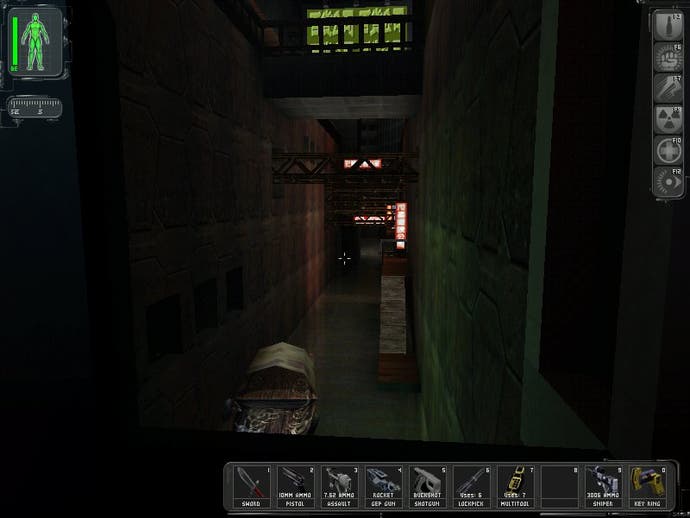
The Six Billion Dollar Man
The nano-augmentation of your character isn't simply an excuse for a plot device, or an explanation for your ability to mow down terrorists; it is a complex part of the game in its own right. At various points in the game you can pick up Nanotech Augmentation canisters, which can be installed into your body by a medical bot.
These canisters contain improvements to basic skills such as strength, speed, regeneration or even resistance to bullets. The decision of what augmentation to use will effect the way you play the game significantly - for example, installing and upgrading the speed and jumping augmentation will allow you to run much more quickly than normal and jump over vast distances, as well as fall from heights without taking much damage.
When combined with your character's penchant for black trenchcoats and sunglasses, it's hard not to feel just a little bit like Neo as you jump from the top of a tall building to escape assailants, hitting the ground running and dashing off like the wind, shouts of disbelief ringing in your ears...
Between the nanotech augmentations, the multitude of different items and tools available, and the open nature of the levels, the number of different ways in which a player can accomplish any given goal is huge; yet Spector and his co-designers seem to have thought of them all. At no time in the game does a character respond in an inappropriate way, and it's almost impossible to "break" the scripted sequences in the game by coming at a problem in an unusual way. Instead, the tantalising number of things which you didn't use in your solution will find you playing through the game again, trying different approaches and solutions to problems and situations.
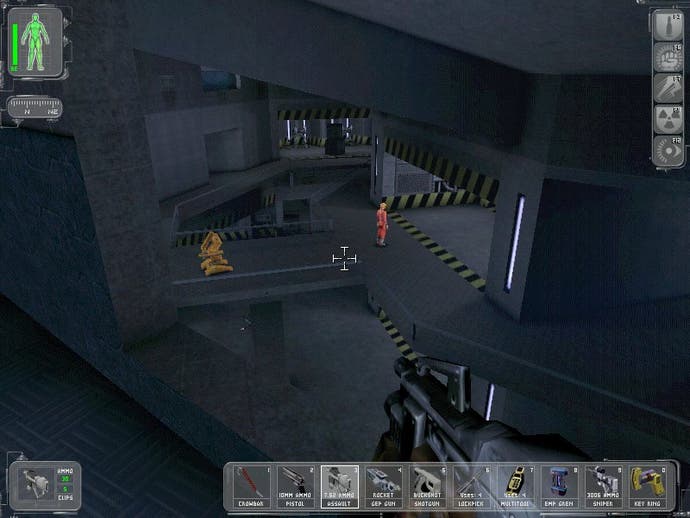
Conclusion
There is no doubt that Deus Ex is a difficult game; many of the problems presented are quite fiendish, and require the player to think laterally, while several of the combat situations are near-impossible if an all-guns-blazing approach is taken. But the game never gets boring, and while you may turn it off in frustration after a couple of deaths, you will soon be itching to get back in and try a different approach.
There is also no doubt that Deus Ex is highly derivative; a cynic can walk through the game naming sources of inspiration with ease, because there isn't really a huge amount of truly fresh innovation here. However, the crucial point is that while Deus Ex's tricks may be old, they are given a fresh spin, and performed with such panache and showmanship that it's hard to find fault in them.
In essence, while Ion Storm have not found perfection with Deus Ex, they have come about as close as anyone ever has with a first person game. Moody and atmospheric, compelling and addictive, this is first person gaming in grown-up form, and it truly is magnificent.
-





